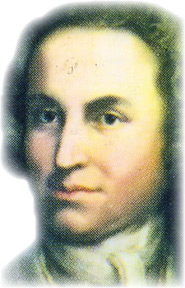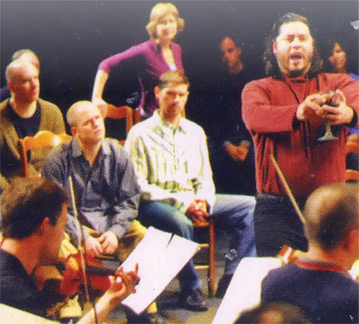Bach's glorious St.Mathew Passion
by Gwen Herat
The world probably thinks of Bach as the composer of the glorious St.
Mathew Passion along with the immortal Suites of Brandenburg Concertos.
|

Johann Sebastian Bach |
In 1727 he began to write St.Mathew's Passion where some of its parts
were performed at the funeral of Prince Leopold. Two years later he
performed the full score that simply sent its embers skywards in a fiery
vision as though its echoes opened the doors of heaven.
Leipzig was seized by its tremors as people grabbed its spiritual
inspiration. Some sleeping Christians awaken to its vibrance, readily
acknowledged Bach as the ultimate in scriptural music.
But Bach never found it easy to perform this one score as he would
have wanted to.
He had pressure exercised on him at Leipzig as he had to face three
problems; that of the church, university and town council and was
commissioned to take over a non-musical teaching post with which he was
not satisfied.
He was not allowed to engage professional singers for his first
performance of St.Mathew's Passion though the Church and the Music
School of Leipzing was to be the centre of Bach's life from 1723 to
1750.
It all happened because the old rector had been a close friend of
Bach but when he died, a young man was appointed and there were many
disagreements they could not iron out. Bach had the courage and patience
to bear all the tribulations as he enjoyed his growing popularity around
the country.
Apart from the great scores he wrote, there is something for which he
is remembered for. This arose from his love for mathematics which
resulted in the cardinal numbers corresponding to the letters of his
name being significant. Number 14 was important to him.
B=A, A=1, C=3, H=8 (2+1+3+8+14) A chorale he wrote shortly before he
died had a theme of 14 notes
14 is 41 inverted which makes the melody numbers 41 notes. This is
the cardinal numbers of J.S. Bach (9+18+14)
German dynasty
The principal melody of the chorale, Wenn Wir Hochsten Noten Sein has
166 notes which are the relating numbers to Johanne Sebastian Bach.
The only musician to the claim of seven generations of Bach as
professional musicians they were, their German dynasty can be traced
back to the 16th century. However, none were able to earn more than a
local reputation and surprisingly its arbiter and law-giver turned out
to be Johanne Sebastian Bach but he achieved only little or limited fame
during his lifetime.
He was the composer of the family with music in his blood. He was
exceptional from the beginning though he had very little formal training
when young. He almost lost his sight trying to transcribe notes that
were denied to him by moonlight from the library and he did with
vengeance when he copied all the instrumental music till his eyes ached.
He lost both his parents in 1694. Bach senior was a good violinist.
He tutored the younger Bach who later was to compose violin concertos
along with church music, secular choral works, chamber, instrumental and
the lute, his speciality being the organ and other keyboards. He had to
take refuge with his older brother after he was orphaned. He was not
very happy to feed an extra mouth and he had little sympathy for him.
However, grudgingly he gave him lessons on the harpsichord. When he
turned 15, he was absorbed into the choir of Luneberg where he had the
freedom to experience in every possible musical pursuit and he
immediately immersed himself in scores, composing and studying the
organ, clavichord and the violin which he loved very much.
|

St.Mathew's Passion by Bach at the National Theatre, South
Bank,
London. |
He led a parochial life and his thirst for every new musical
experience open to him was important in the extraordinary diversity of
music to write. He loved the organ so much that he walked a distance of
213 miles when the celebrated organist, Dietrich Buxtehude gave a
recital once-weekly concert.
Though exhausted he was so elated that he began interpolating
elaborate cadenzas and variations into staid chorales. He kept moving
on, climbing up the ladder, getting married in the process to his
cousin, Maria Barbara.
He left his post at Münchhausen to become the court organist to Duke
Wilhelm Ernst of Weimar.
It is at this time that he composed some of his finest organ works.
He remained for nine years and was made conductor of the court orchestra
in 1714. Passacaglia and Fugue in C minor and many of his great preludes
and fugues debuted around this time.
Obstacles
As he advanced in his career. He had many obstacles when he accepted
the post of music director to Prince Leopold of Anhalt in Cothen. Duke
Wilhelm was furious and put him under arrest for one month.
When at last Bach arrived in Cothen, it was the beginning of his
career. He saw his Brandenburg Concertos first appear in the book of
Well-Tempered Clavier.
It was during these moments of a visit with the prince that he heard
the death of his wife. He remained a widow with his seven children for
one year before marrying Anna Magdalena Wilcken who was the daughter of
the court trumpeter. Weissenfels bore him 13 children. Of the 20
children, six children did not survive into adulthood.
Bach's sight was failing due to cataract towards the end of his
illustrious career. John Taylor who operated on Handel for sight
failure, took on Bach but left him almost blind but a miracle did
happen. His sight miraculously returned.
Medical opinion was that his cataract may have receded spontaneously.
It allowed him to complete his final work, The Art of Fugue. Two
weeks later he passed away due to cerebral haemorrhage. He was 65 years
when he died and was buried in the churchyard of St. John in Leipzig.
|

